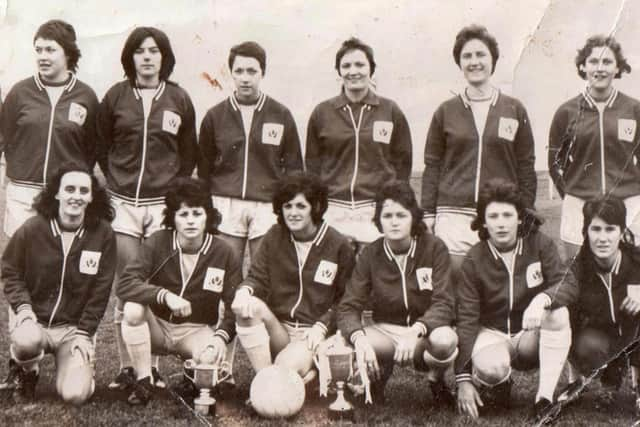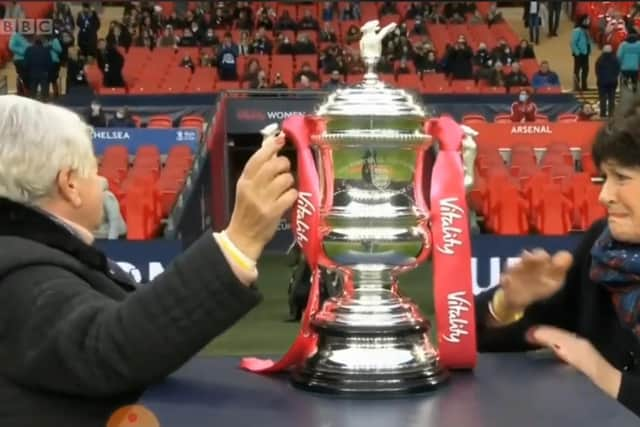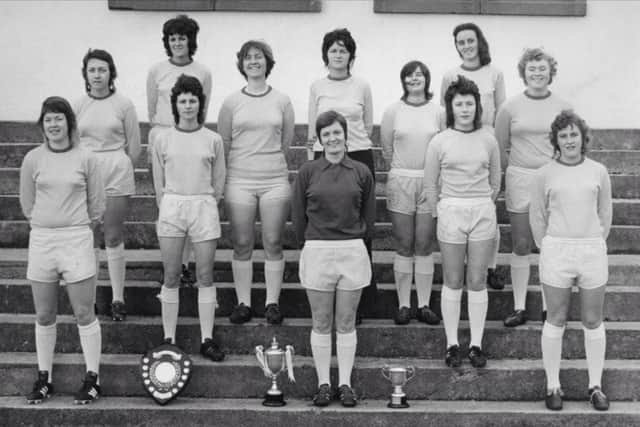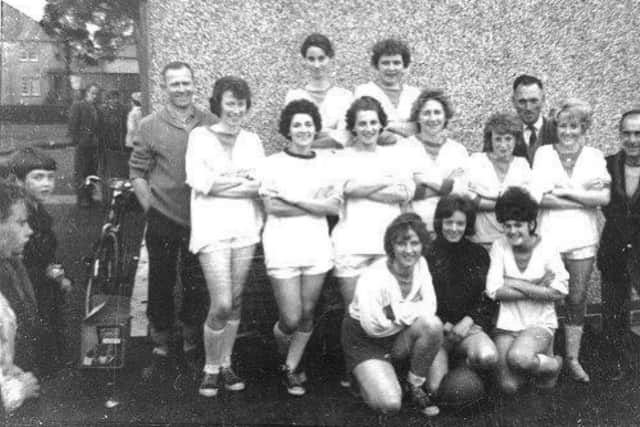Football legend Elsie Cook: 'I had to prove that women could play'
It’s been a week since she stepped onto the pitch at Wembley to place the Women’s FA Cup on a plinth, when it felt as if all the young female players she had brought through the game over the past 50 years surrounded her in one almighty moment.
“I’ve never experienced anything like it. For a few seconds, it was like I wasn’t there, it was like an out of body experience, but it felt so comfortable.
Advertisement
Hide AdAdvertisement
Hide Ad“I didn’t know what it was. It’s as if all the girls, all my memories from 1961 on flooded into me. I think it might be like how you feel when you meet the ghost of someone you love,” said Elsie, now 75, who went on to manage the Scotland women’s team.


The year 1961 was when everything changed for Elsie and women’s football in Scotland when, at the Strandhead Park in Stewarton, her netball team – run by her mother, Betty - became a football team for the afternoon to play a charity match for Ethiopia.
"We borrowed football boots from everyone we could, we borrowed the strips and the ball and we put copies of the Sunday Post down our socks for shin pads,” she added.
With 20 minutes to go until kick off, Elsie, 14, read the team sheet again, with the defence made up of her Auntie Helen, Auntie Nancy, her mum and Elsie herself, who played centre half.
“I had only kicked a ball when I was about 11. I realised Auntie Helen has not turned up. Auntie Nancy said to me “I told you, she’s pregnant again,” Elsie said.


Nerves had been building for the arrival of Susan Ferries from Riccarton. Word on the Kilmarnock supporters football bus was she could play better than most men and when she arrived at the park, wearing a white dress, starched petticoat, high heels and with a mass of blond curly hair, women’s football in Scotland hit a turning point.
Susan, with her second-hand boots bought from Cheapside Bargains in Kilmarnock, scored all seven goals against the Holyrood Bumbees, a factory side from East Kilbride.
Her boots, which lasted all 12 years of her time with Stewarton Thistle, are displayed at SFA Museum with her Scotland cap.


Advertisement
Hide AdAdvertisement
Hide Ad"After that day, that was me on a mission to prove to men and to women that lassies could play fitba and it was because of Susan Ferries,” Elsie said.
"I was scouring villages and asking ‘do you know any lassies that play?’. At least six of them in the team had played all their lives with boys. They had an edge to their game and that is why Stewarton Thistle got to the final of the Women’s Football Association final.”
Playing at that final on December 5, 1971, was Rose Reilly, from Kilmarnock, who joined the team aged nine and went on to play professionally in France and Italy.
The match at Crystal Palace Sports Ground – “the grass was up over our ankles” – was played against Southampton Ladies, captained by Lesley Lloyd, with Stewarton beaten 4-1.


Last Sunday marked the 50th anniversary of the historic game, with Elsie and Lesley meeting once again to take the cup onto the pitch at Wembley.
Elsie said: “It was so emotional being there. I was really excited and looking forward to it, but when it came down to it I was standing in the tunnel with Lesley and we were holding hands as we were so nervous. I was worried I’d drop the cup.”
In 1971 when Stewarton Thistle were playing in England, women were still banned from playing on Scottish Football Association pitches or using their officials.
Sometimes, caretakers at council-run grounds would slip Elsie the keys to the changing rooms on condition she would clean up after the weekend games.
In 1972, the Scottish Women’s Football Association was formed, but they still weren’t allowed access to a SFA referee or ground.
Elsie was elected secretary and their first game – Scotland v England –was played at Ravenscraig Stadium in Greenock in November, with her eldest daughter Lorna, then four, leading the team onto the frozen pitch as the club mascot. The game ended 2 – 3.


The sport was riding high but the energy Elsie was devoting to her team was causing issues at home.
She said :"My husband said, ‘it’s me or the fitba’ and I said ‘it’s ok, I’ll resign. I took the kids through to Edinburgh with me on the train to a meeting and the first point on the agenda is my resignation. I said I couldn’t do it anymore and they gave me an award, they were all very nice.
“I sat back down with the girls and then the appointment of the Scotland manager was discussed.
"Somebody shouted from up the back ‘we want Elsie to do it’.
"I had to go home on that train and tell my husband. I couldn’t even feel proud. I was terrified.
"He was washing his cup at the sink. He asked me if I resigned, I said ‘of course I did but...I’ve been appointed Scotland manager’
"He just turned back to the sink and went through to watch his favourite programme, Kojak. There was not a word out of him all night, but I did get the feeling he was quite chuffed.
"Football had taken over my whole life but I had to prove women that women could play.”
On the pitch at Wembley last Sunday, Elsie got a powerful reminder she had proved all her doubters wrong.
A message from the Editor:Thank you for reading this article. We're more reliant on your support than ever as the shift in consumer habits brought about by Coronavirus impacts our advertisers.
If you haven't already, please consider supporting our trusted, fact-checked journalism by taking out a digital subscription.
Comments
Want to join the conversation? Please or to comment on this article.
